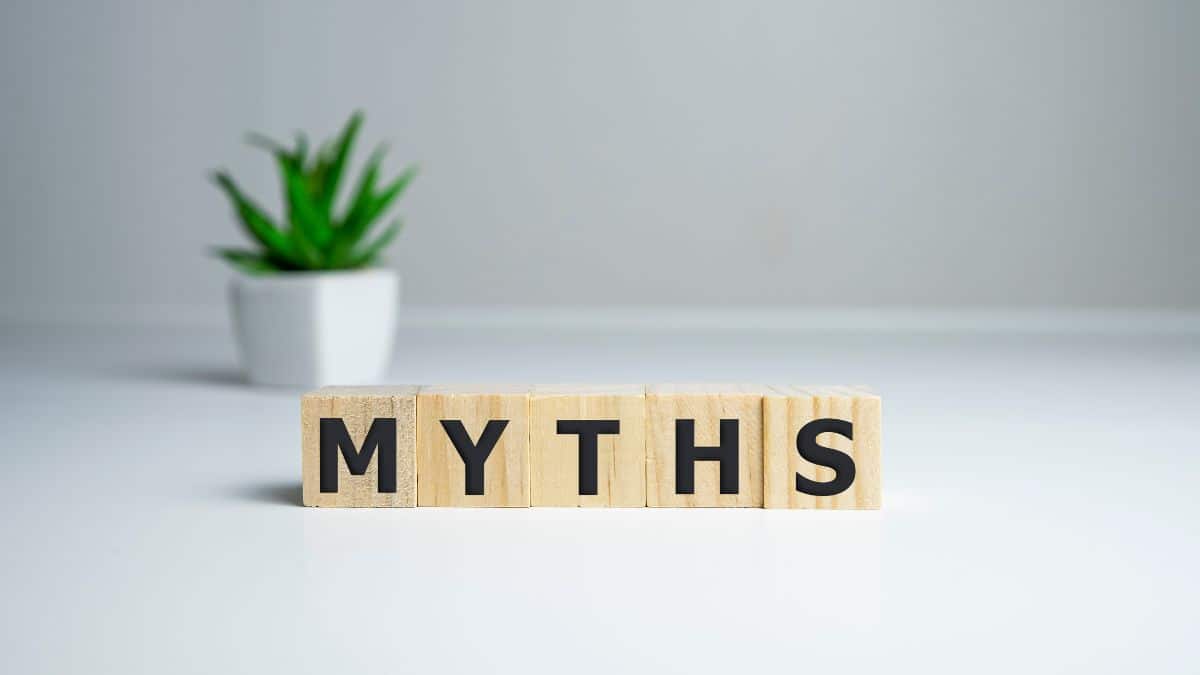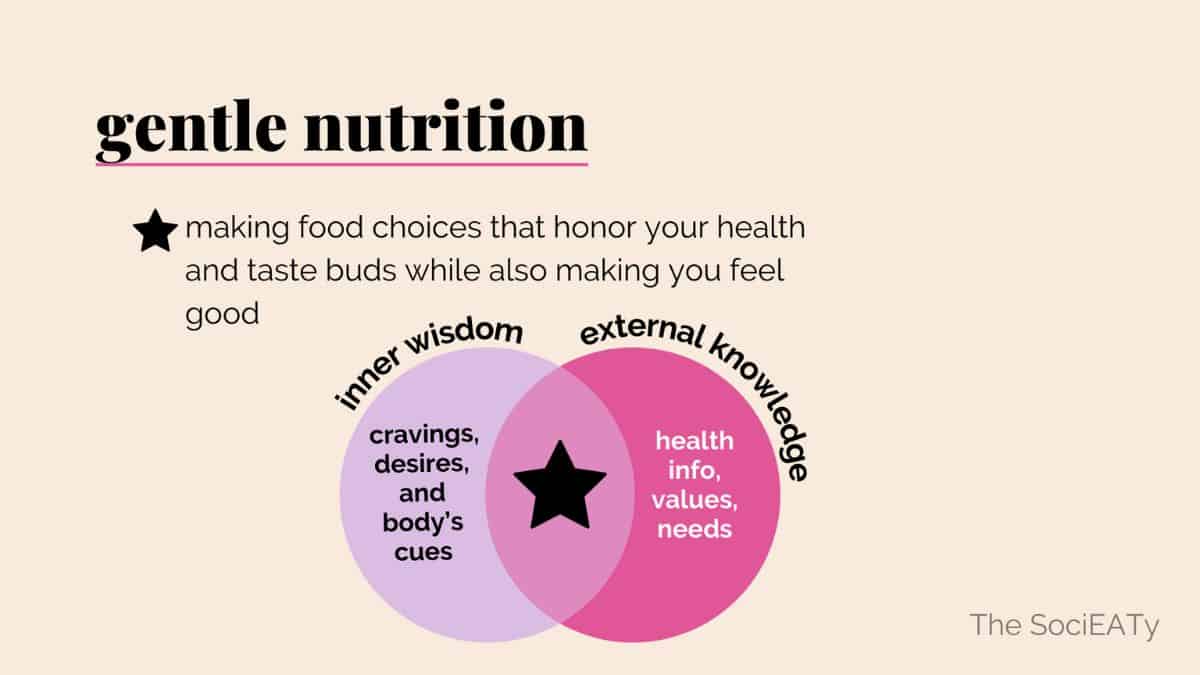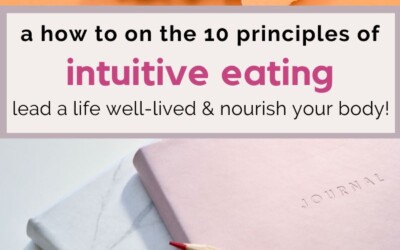Intuitive Eating is a super trendy topic right now thanks to its recent social media explosion. Women are sick to death of diets – from false promises to downright lies, you are probably ready for something different…something far better! Intuitive Eating offers just that. But, with this boom of awareness and popularity comes a LOT of myths and misconceptions about what Intuitive Eating is…and what it isn’t. Who can you trust?

In this blog post, I’ll walk you through ev-ry-thing you need to know about becoming an Intuitive Eater. With this intel, you’ll be able to decide if this path is the best one for you to explore further (I think you’ll be suuuper excited once you read through this post!).
New to No Food Rules? Welcome! I’m Colleen, a Registered Dietitian, and Certified Intuitive Eating Counselor. I help gals like you break free of diet culture so that you can achieve true health and wellness, and – drumroll please – joy with eating.
So, what to expect? In this blog post, I’ll be introducing you to exactly what Intuitive Eating is and explain how it is backed by science (I am a dietitian, after all). I’ll also be weaving a few other posts and resources throughout so as your interest is piqued, you’ll have plenty of opportunities to keep reading and continue learning. I’ll also invite you to check out The SocIEATy, my virtual membership program. I created the SociEATy because I don’t believe anyone should struggle as much as I did. Or take on this journey alone!
And, without further ado: let’s dive in!
What is Intuitive Eating?
Intuitive Eating is not a diet or a diet plan…and it isn’t actually all that new.
Intuitive Eating is sooooo different from diets because as an Intuitive Eater, you’re not trying to “control” your weight. Spoiler alert: When we try to control our weight with dieting we actually LOSE control – ugh!
Intuitive Eating is about finding the eating pattern that allows you to feel good, mentally and physically. No shame, no food rules, no binge eating, no energy slumps on repeat.
Intuitive Eating is an approach to eating that helps you get back in touch with your body’s natural ability to guide your eating choices while still taking into consideration things like emotions, enjoyment, satisfaction…and yes, nutrition.
We started life as Intuitive Eaters. As babies, we cried when we were hungry and stopped eating when we were full. We lost our ability to eat intuitively because of outside influences; our parents telling us to finish what is on our plate, going on diets, following food rules, and pursuing weight loss. In order to return to Intuitive Eating, we must get rid of these diets, food rules, apps, and trackers. (And leave the clean plate club!)
In the beginning, Intuitive Eating feels quite foreign because we are so used to dieting! Intuitive Eating is about working WITH your body, not against it. I know that I sure felt like a fish out of water when I first began letting diets go…how do I eat like a normal person now without my rules and apps to tell me? But don’t you worry about that, I’m here to guide you.
Intuitive Eating is amazing. My journey began when I started to notice just how much my disordered eating was impacting my life, and my relationship and potentially impacting my ability to have a family. Discovering the Intuitive Eating book allowed me to make progress on my journey much more quickly. I recommend you grab a copy, too!
Where Did Intuitive Eating Come From?
Intuitive Eating (sometimes just abbreviated IE) has been gaining momentum since the OG book was published in 1995 by two Registered Dietitians: Elyse Resch and Evelyn Tribole. In 2021 the authors came out with the latest (fourth!) edition of the intuitive eating book.
Since 1995, many registered dietitians have trained directly with Elyse and Evelyn to learn how to 1) become Intuitive Eaters themselves and 2) how to help others achieve food freedom. And hey: I’m one of them! I’m a Certified Intuitive Eating Counselor.
To help make Intuitive Eating more digestible to readers (food pun intended there!) the authors developed 10 principles to help guide you to getting back to a state of eating intuitively.

The 10 Principles Of Intuitive Eating
What are the basic principles of Intuitive Eating? Let’s explore the ten principles here. For each of them, I have related blog posts and resources listed below.
One thing that I love about Intuitive Eating is that it can be a bit of a “choose your own adventure”. Although they’re listed one through ten, you get to start at whatever principle feels best to you…and this is a fab way for you to start building trust with your body and intuition.
Hot tip: as you’re reading these ten principles, pick one or two related blog posts and bookmark them to read soon.
- Reject The Diet Mentality: This means that you get rid of diet books, your calorie counting app, etc. in an effort to be able to re-learn how to be an intuitive eater.
- Honor Your Hunger: Our bodies DO have the ability to regulate our energy intake in a MUCH more accurate way than a calorie counting app.
- Make Peace With Food: This is also where you let go of food guilt and seeing foods as “good” or “bad”.
- Challenge The Food Police: this principle is all about saying “hush-hush” to that mean voice in your head questioning if you really should be eating that treat or doing something that I call “rewiring your brain” away from diet culture.
- Feel Your Fullness: With practice, our body can say “enough is enough” and end a meal when you’ve truly had enough.
- Discover The Satisfaction Factor: Eating SHOULD be enjoyable.
- Cope With Your Emotions With Kindness: Learning how to avoid excessive emotional eating and develop other constructive coping mechanisms is key to intuitive eating.
- Respect Your Body: We must learn to accept our “genetic blueprint” and work to find our body’s set point weight. No more trying to shrink our body into being socially “acceptable” by diet culture’s unrealistic standards.
- Movement – Feel The Difference: This principle shifts the focus from “burn to earn your food” and slugging through workouts you hate to finding something called “joyful movement”.
- Honor Your Health – Gentle Nutrition: Nutrition and health information DO play a role in intuitive eating! Intuitive eating, after all, is about learning to get back in touch with our bodies and our brains ARE part of our bodies! The concept of intuitive eating WAS created by two Registered Dietitians, just like myself.
That is among the briefest of overviews of the ten principles. To dive a little deeper, check out my full post on them, here: What Are the 10 Principles of Intuitive Eating (And How They Can Help You).
In general, there are technically no specific rules for how you’re supposed to move through the ten principles. You can start with one or more of them and work on integrating them into your life, your eating habits, and your belief systems.
Buuuuuut…this is about 10 zillion times easier said than done. What I’ve found is that my clients are the most successful (and less overwhelmed or frustrated) when they implement these principles in a specific order. When you’re used to the structure and rules of dieting, having so much freedom can feel, well, overwhelming. That’s why I created The SociEATy, a membership that teaches how to become an Intuitive Eater and actually live your best life. The work of letting diets go and becoming an Intuitive Eater is not all sunshine and rainbows, but it is 100% worth doing.
Keep reading, I’ll tell you exactly what that order is in a minute!
Who is Intuitive Eating for?
Intuitive Eating is right for…just about anyone! Men, women, children, families and even people with health conditions or allergies/intolerances that require changes to their foods or eating patterns. I cover that, right here: How To Eat Intuitively With Dietary Restrictions.
Intuitive Eating is a science-backed way to eat in connection with your physical body, your emotions, and your cravings, in your real life (I’ll share some of the research in just a sec – keep on reading!).
Intuitive Eating is for anyone wanting to be healthy…like actually healthy. We tend to think that going after a certain number on the scale is the pathway to health, but here’s the truth: your weight is actually crappola at telling you how healthy you are. Weight being a measure of health is one of those slippery lies that diet culture tells us.
What is healthy? Intuitive Eating! Check out this full post with the scoop (including the research studies): Tell Me the Truth: Is Intuitive Eating Healthy? Yes!
Intuitive Eating isn’t about trying to micromanage your meals, calories, or macros. And it isn’t about more rules or regulations. In fact, Intuitive Eating is about letting those food rules go.
Are you really “eating healthy”?
Find out just how helpful (or harmful!) your food choices are!
Take this 30 second quiz to find out!
So for anyone who feels like nutrition and eating is a struggle…Intuitive Eating can bring ease, enjoyment, and satisfaction.
Who is IE not right for?
Intuitive Eating is not right for anyone looking for a quick fix, a fad diet, or weight loss. Intuitive Eating isn’t something to try before an event or vacation, like a spring break weight loss challenge (Pssst: Here’s Why You DON’T Need a Spring Break Weight Loss Challenge).
Intuitive Eating is about building a relationship with your body that is on a foundation of trust, joy, health, and pleasure. And lemme tell you: it isn’t too good to be true.
If you’re seeking Intuitive Eating and want to lose weight, I’ll work with you to help let that goal go and instead start to focus on how your body feels VS what it weighs.. (See post: How to Get Over The Fear of Gaining Weight.)
Seeking weight loss isn’t healthy. While some people lose weight with Intuitive Eating, others gain weight and still, others stay the same. We just can’t predict what your journey will be.
The weight – whatever it may be – is not the goal with Intuitive Eating. Weight isn’t a good measure of health and focusing on the scale causes real and measurable harm. In fact, I recommend getting rid of your scale entirely and I explain why here: When To Weigh Yourself: Don’t.
So, we’ve talked about what Intuitive Eating is…how about what it is NOT? Let’s take a few of the most common myths and misconceptions and bust ‘em.

Intuitive Eating Myths
Here are the three most common misconceptions about Intuitive Eating and what the full truth actually is.
Intuitive Eating Is NOT The Hunger & Fullness Diet
One common misconception is that intuitive eating is essentially the “hunger-fullness diet” but this is simply not true. While, yes, learning to listen to one’s hunger and fullness is a key piece to the intuitive eating puzzle it’s not the only piece like it is with the hunger and fullness diet.
Here is an example: you’re at a birthday party and they’re serving cake. Maybe you don’t feel hunger cues but you still have full permission to enjoy a slice if you like (I totally would!). This is actually a form of emotional eating, you’re celebrating and enjoying.
An intuitive eater is able to do this without guilt and in a way that feels good (meaning they typically don’t feel super full or uncomfortable after it). An intuitive eater can leave whatever amount on their plate in order to allow them to feel good. OR… go back for seconds if they wanted to: guilt-free!
Intuitive Eating Is NOT The Same As Mindful Eating
“Mindful eating” (first used in 1999, 4 years after the first edition of Intuitive Eating) is a common term today that often gets used alongside “intuitive eating”. And while, yes, they do have some overlap they also have differences.
Here is an overview of what The Center For Mindful Eating states that mindful eating is:
- Allowing yourself to become aware of the positive and nurturing opportunities that are available through food selection and preparation by respecting your own inner wisdom.
- Using all your senses in choosing to eat food that is both satisfying to you and nourishing to your body.
- Acknowledging responses to food (likes, dislikes, or neutral) without judgment.
- Becoming aware of physical hunger and satiety cues to guide your decisions to begin and end eating.
Essentially, intuitive eating takes this one step further by incorporating satisfaction, emotions, physical activity, and nutrition. It’s a more dynamic process.
Intuitive Eating DOES Include Nutrition
One of the BIGGEST misconceptions that I hear about intuitive eating is that it doesn’t take nutrition into consideration. As a Registered Dietitian myself, and having spent 11+ years learning about nutrition in order to become one, I know nutrition is important! Nutrition information does play a role in intuitive eating. You can be an intuitive eater and also eat in a way to foster physical health.
The difference between incorporating nutrition information as an intuitive eater VS as a dieter is that it’s just ONE factor in your food choices, it’s not the sole factor. There is no all-or-nothing thinking (i.e. I gotta eat kale all week or I might as well eat donuts!) It’s more of what I call “gentle nutrition”. I have an entire gentle nutrition blog post here for you to check out!
Remember: our brains are part of our bodies. So when you hear the phrase “listen to your body” that DOES include nutrition info!
I like to explain intuitive eating and nutrition with the image of a Venn diagram (see below- it’s a screenshot of a slide from what I teach inside of The SociEATy). You have your more primal instincts (cravings, desires, etc) as one circle then you have health/nutrition info as the other. Being an intuitive eater is that middle area- where BOTH are taken into consideration!

Note: these circles can ebb and flow throughout life. Someone with a dietary restriction (like an intolerance, allergy, etc) may need to apply more of that nutrition knowledge than someone without. Or, someone who, say, maybe just had a baby and is just in survival mode may rely more on those primal cues.
For more on how to navigate having dietary restrictions be sure to check out my blog post on intuitive eating and dietary restrictions. It CAN totally be done!
Exclusive SociEATy member content:
Show me the research
The concept of intuitive eating can seem far-fetched since it’s so different from traditional “diets” or “lifestyles”. So, it’s natural to want to see the evidence that intuitive eating can be health-promoting- both mentally and physically.
There is a large body of research that supports intuitive eating as a practice to improve health outcomes. Here are some of the areas that are backed by intuitive eating research:
- Reduced binge eating – full permission to eat what you want is THE best way to reduce the urge to binge
- Higher self-esteem and body positivity
- Improved dietary quality – including eating more fruits and vegetables
- Higher levels of emotional awareness
- Better lab values – including better cholesterol and decreased blood pressure
- Better blood sugar control for women with gestational diabetes and postpartum women
- Increased physical activity (amazing what happens when you’re moving because you enjoy it instead of exercising because you *should* or as a way to “earn” your food, as I used to do).
And that’s just to name a few! So to everyone (my past self included!) saying “Yeah, well I want to be healthy, too” You totally can be – and I encourage it!
If you want more evidence be sure to check out my blog post on the 12 reasons not to diet. It’s loaded with reasons why diets fail (it isn’t YOU!).

Intuitive Eating Before and After
So, what is it like to be an Intuitive Eater?
Sometimes when people are looking into Intuitive Eating they look for a before and after. What they’re looking for is a photo. And…if they’re being honest…they want the after photo to be slimmer than the before.
And although this is a really hard thing to let go of: you cannot judge how healthy a person is by their size. Real health and wellness can be measured in lab values, stress levels, and room for joy.
Here are a few recent wins from SociEATy members who are well on their way with Intuitive Eating.

The win I am most proud of is being able to change dinner plans without having a panic attack. If my family wants to order pizza on a Tuesday, it’s no big deal! I no longer feel completely paralyzed by food.
-Micaela R.

My biggest win so far from the SociEATy is gaining my period back! For years, I have had an irregular period due to restriction and have done birth control before in order to get it started. For myself, I knew I wanted to start my period naturally so with the SociEATy, I have already incorporated more fats and whole foods into my diet which has helped me gain my period back!!!
-Stephanie K.

Lots of wins are happening this month, but the one I am the most proud of is craving a salad in a restaurant and a delicious dessert too without labeling the salad as a “good” choice, or the dessert as a “bad” one. I ate both, enjoyed, and continued with my day without thinking about my food choices! I no longer feel completely paralyzed by food.
-Judith G.

Biggest wins-being able to keep cereal and Oreos in my house and eating them mindfully. Also, less shaming of myself and more enjoyment of the foods I’m eating.
-Laurel H.

I think my win that I am most proud of in these past 3 months is realizing I don’t need to diet or lose weight to enjoy special moments in my life! Since starting the SociEATy, I have gone on vacation to Oregon, Nevada, and Southern California, with a family wedding and another trip to Nevada in the coming weeks that I know I won’t have to worry about pressuring myself to eat better and work out extra just to feel “good” about myself. I know that my self worth and enjoyment of life is not determined by what I look like in the mirror or what I put in my body!
-Bailee D.
Now that you’ve gone through this beginner’s guide to Intuitive Eating, what’s your next step? First off: bravo! It is brave to go against what you know and to explore what is best for you. Intuitive Eating offers so many benefits for you, your family, and your future.
I have a few tips for you to get started.
Tips To Get Started
By now I hope you have gained a more clear picture of what intuitive eating is (and what it isn’t) as well as if it’s right for you.
- Grab a copy of this free e-book: The 5 Unskippable Steps To No Food Rules (And The 5 Most Common Missteps!) If you’re feeling nervous about starting your intuitive eating journey and feel unsure if you’re ready to dip your toes into this end of the pool don’t worry, I’ve got you. I created a super quick (and fun!) guide so that you can make progress fast…without making every single mistake that I did when I was getting started. These are the 5 stages I bring my clients through in The SociEATy…and they work time and time again! It is my gift to you.
- Don’t try to do all of the things at once… it’s a recipe for overwhelm and disaster! Start with step number 1 of that e-book you just downloaded (you did, right?!) which is ditching diet culture. You can easily start this today by going through your social media feeds and unfollowing diet-y accounts and following some food freedom, intuitive eating ones. Also, delete MyFitnessPal, the WW app, etc!
- Are you a gold-star kind of gal? Well, here is a bonus tip for getting started: subscribe to my YouTube Channel. You’ll get access to my foundational, super helpful, non-diet-y videos so that you can start learning Intuitive Eating principles right away. Plus, with that info you’ll be able to better avoid those social media influencers who are peddling faux Intuitive Eating crappola. Don’t be fooled: my videos will help.
One final note here: Remember that intuitive eating is a journey. You didn’t learn diet culture messages overnight so you won’t get rid of them overnight either. Be sure you have support and guidance along the way to help make the un-learning process easier. And if you’re ready to take that step be sure to check out The SociEATy membership community.
The SociEATy is different from any other membership, course, or program out there. It is truly a unique, step-wise, structured approach to intuitive eating that has worked time and time again for thousands of members. And you’re next. Isn’t that exciting?!
XOXO
-Colleen
(Your non-diet intuitive eating dietitian bestie)

The SociEATy is your Anti-Diet safety net! Diet culture is appealing because of the community, structure, and goals. So it MAKES SENSE that it’s hard to leave behind. I created the SociEATy—the community that actually EATs!—with all the GOOD things dieting has to offer baked in. So you don’t have to free-fall into this new way of life!






Avril says
Thank you for this ! I actually I am starting the journing and I love about joyful movement because I actually like to move but not as workouts .
Colleen says
You’re so welcome! I’m so happy it was helpful!
Milan says
I never heard of intuitive eating until my friend mentioned it to me, and I have been doing some reading up on it. I want to try it because I have been dieting for months and just can’t seem to lose weight. I also have an unhealthy relationship with food in which I guilt myself a lot. But I found another great read about it, https://www.ez.insure/landing/2021/07/is-intuitive-eating-the-key-to-better-health/ and I want to definitely give it a go. Any tips on starting?